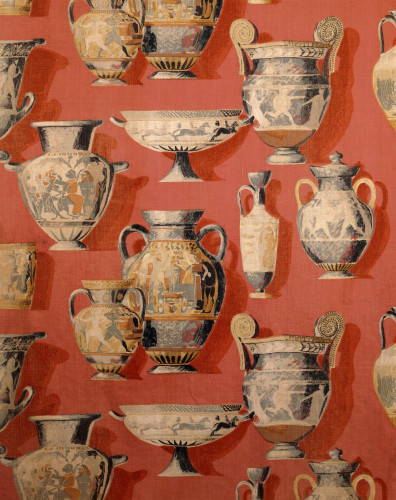152/1996-2
Collection
Textiles
Brief description
One of a pair of curtains made from cotton printed with a design of Greek urns and vases on a terracotta ground, manufactured in France and purchased in London in c.1958-1962. This object was donated to the museum by the original owner and there is a Documenting Homes collection, 185/2010, associated with this object.
Object name
curtain
Object number
152/1996-2
Location
On Display
Production date
1958-1962 (manufactured)
Production place
France (manufactured)
London (retailed)
London (retailed)
Period
Twentieth century (1900-1999)
Material
cotton
polyester
polyester
Technique
woven
printed
printed
Physical description
One of a pair of cotton curtains, printed with a design of greek urns and vases of different shapes and sizes on a terracotta ground.
Dimensions
Length: 232.5cm
Width: 177.5cm
Width: 177.5cm
Website keywords
textiles
window treatments
window treatments
Label
Label text, Geffrye Museum, date unknown:
Curtain, Linen, French, Purchased in London, c1959.
Caption for Exploring 20th Century London website:
This curtain was used in the late 1950s in a family home in Hillside Gardens on the Southwood House Estate in Highgate.The owner bought the house from new for £5,050 in 1958 and had a successful career in the pharmaceutical industry. The estate of 43 houses was designed by the architect Harley Sherlock and the houses were built in the modern, open plan style with large picture windows, and parquet flooring. According to a history of the estate one of the residents wrote that the houses appealed to people who 'preferred Heal's to Maples' and the communal gardens attracted young families with children.
Curtain, Linen, French, Purchased in London, c1959.
Caption for Exploring 20th Century London website:
This curtain was used in the late 1950s in a family home in Hillside Gardens on the Southwood House Estate in Highgate.The owner bought the house from new for £5,050 in 1958 and had a successful career in the pharmaceutical industry. The estate of 43 houses was designed by the architect Harley Sherlock and the houses were built in the modern, open plan style with large picture windows, and parquet flooring. According to a history of the estate one of the residents wrote that the houses appealed to people who 'preferred Heal's to Maples' and the communal gardens attracted young families with children.

